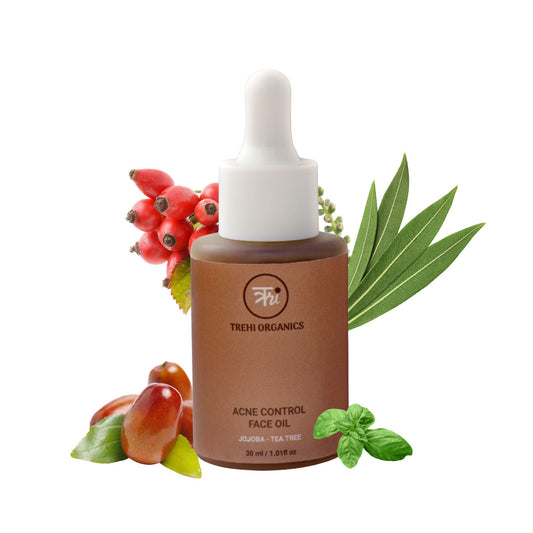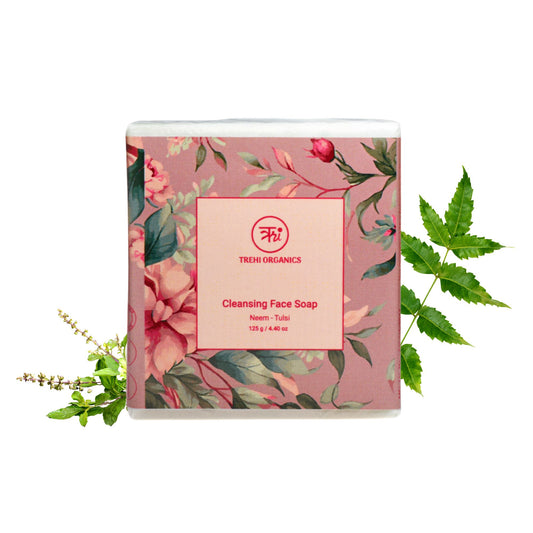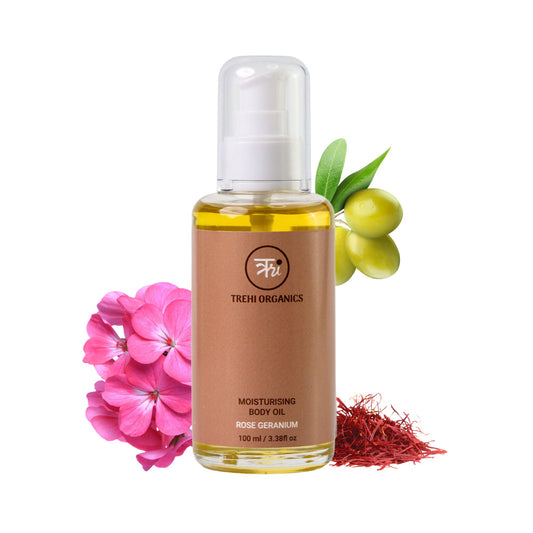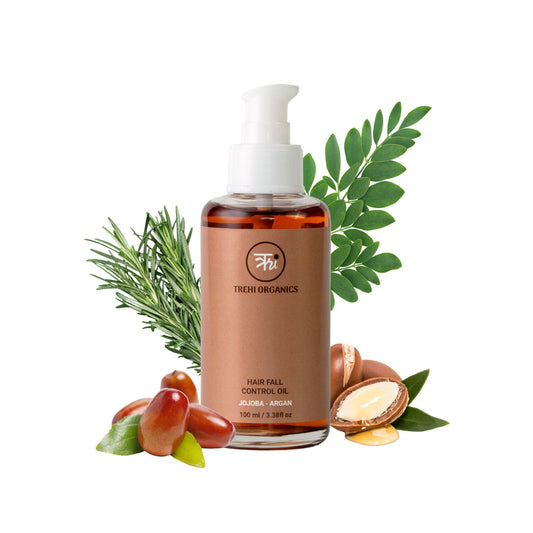Imagine you're rocking your favorite outfit, feeling like a superstar. Your hair's on point, and you're ready to slay. But then, bam! You spot those annoying acne spots in the mirror. Total bummer, right?
But here's the good news: Acne management doesn't have to break the bank or involve harsh chemicals that could harm your skin's natural balance. Believe it or not, some simple natural oils can be your skin's best ally in the fight against acne.
Understanding Acne
Acne is a skin condition that occurs when the tiny pores in your skin become blocked. These blockages can result from a buildup of oil, dead skin cells, or bacteria. When this happens, it can lead to the formation of pimples, blackheads, or whiteheads on your skin. Acne can be influenced by factors such as hormonal changes, genetics, or certain dietary choices. While it's common to experience acne, particularly during puberty, maintaining good skin hygiene can help minimize its occurrence.
Irritation Instigator: Dealing With Dark Side
Before diving into solutions, let's discuss some commonly promoted acne-fighting products. Oral antibiotics, while sometimes prescribed, aren't typically used for long periods due to potential health risks. They can mess with your body's natural balance of bacteria (the microbiome) and make bacteria resistant to antibiotics over time.
Then there are topical treatments like creams and gels. Using too much of these can lead to problems like excessive dryness and irritation. When your skin barrier gets compromised from overuse, it's like leaving the door wide open for more inflammation. Plus, it can make any medication you're using less effective.
Here's a list of chemicals you should be cautious about:
|
Category |
Ingredients |
|
Carcinogen |
Paraphenylenediamine (PPD), Coal Tar Hair Dye, Formaldehyde, BHA & BHT, Coal Tar, Hydroquinone, Toluene, Lead, Octinoxate, Diethanolamine, Butylphenyl methylpropional. |
|
Developmental Toxicity |
Retinoic acid derivatives (Retinol, Retin-A, etc.) |
|
Allergies, Irritation, and Immunotoxicity |
Fragrances, Lanolin, Propylene Glycol, Triethanolamine (TEA), and other common allergy triggers, Benzyl peroxide. |
|
Occupational Hazards |
Diethanolamine (DEA), Triethanolamine (TEA), and other amines that release formaldehyde under certain conditions |
|
Enhanced Skin Absorption |
Salicylic acid, Glycolic acid, Lactic acid, Citric acid, and other alpha hydroxy acids (AHAs) and beta hydroxy acids (BHAs) |
|
Contamination Concerns |
Heavy metals, pesticide residues, and other persistent pollutants |
|
Endocrine Disruption |
Bisphenol A (BPA), Phthalates, Perfluoroalkyl substances (PFAS), and other estrogenic or antiandrogenic chemicals |
|
Neurotoxicity |
Mercury, Lead, Arsenic, and other heavy metals that can disrupt neurological function |
|
Organ System Toxicity |
Alcohols, Benzophenones, Toluene, and other solvents that can damage organs like liver, kidney, or lung |
|
Reproductive Toxicity |
Paraphenylenediamine (PPD), Coal Tar Hair Dye, Quaternium-15, Parabens, Formaldehyde, BHA & BHT, |
|
Use Restrictions |
Certain phthalates, Triclosan, Fluorinated telomer substitutes, Benzyl peroxide and other chemicals regulated by governments |
Note- We have compiled a list of some of the most common chemicals found in skincare products. However, it's crucial to note that this list is not exhaustive. When assessing other skincare products, you can utilize the Environmental Working Group (EWG) website to investigate the potential concerns associated with additional ingredients. This empowers you to make informed choices about the skincare products you use.
Natural Oils For Acne-Prone Skin
Here are some natural oils for acne that can provide relief without irritating your skin:
Jojoba Oil:
Apart from treating acne and skin conditions, jojoba oil also regulates sebum production, making it beneficial for both oily and dry skin types. It's non- comedogenic, meaning it won't clog pores, and it's gentle enough for sensitive skin. Additionally, jojoba oil can help reduce the appearance of fine lines and wrinkles, promoting a more youthful complexion.
Rosehip Oil:
In addition to its antioxidant properties, rosehip oil contains essential fatty acids that help improve skin texture and tone. It's particularly effective in fading dark spots and hyperpigmentation, giving the skin a more even appearance. Rosehip oil is also known to soothe sensitive skin and alleviate symptoms of conditions like eczema and dermatitis.
Kalonji Oil:
Kalonji oil not only reduces redness and inflammation but also has antimicrobial properties that can help fight acne-causing bacteria. It's often used to treat skin infections and minor wounds. Moreover, kalonji oil can promote hair growth and strengthen hair follicles when applied to the scalp.
Hemp Seed Oil:
In addition to moisturizing the skin, hemp seed oil contains omega-3 and omega-6 fatty acids, which help maintain skin elasticity and firmness. It's a natural humectant, meaning it draws moisture from the air into the skin, keeping it hydrated for longer periods. Hempseed oil also has anti-inflammatory properties that can help soothe conditions like eczema and psoriasis.
Holy Basil Essential Oil:
Holy Basil essential oil is not only beneficial for the skin but also has aromatherapy benefits, promoting relaxation and reducing stress levels. It's often used in skincare products for its calming and rejuvenating effects. Holy Basil oil can also improve blood circulation when massaged onto the skin, leading to a healthy, radiant complexion.
Tea Tree Essential Oil:
In addition to its acne-fighting properties, tea tree oil has antifungal and antiseptic properties, making it effective in treating various skin infections like athlete's foot and nail fungus. It can also be used to soothe insect bites and minor cuts and scrapes. Tea tree oil is a versatile oil that can be added to skincare routines to address a wide range of concerns.
Incorporating Natural Oils for Acne-Prone Skin Care
Now you know oils that can help with acne and how to incorporate them into your routine. Here are some tips!
- Patch Test: Before applying any new oil to your face, it's important to do a patch test on a small area of your skin to check for any allergic reactions or sensitivity.
- Dilution: Some essential oils, like tea tree oil, can be potent and may need to be diluted with a carrier oil, such as jojoba or coconut oil, to prevent irritation.
- Start Slowly: When introducing new oils into your skincare routine, start with a small amount and gradually increase the frequency or concentration as needed.
- Consistency is Key: For best results, use natural oils consistently in your skincare routine. Incorporate them into your daily cleansing and moisturizing regimen.
- Be Patient: Natural remedies often take time to show results. Give your skin time to adjust to the new oils and be patient with the process.
- Monitor for Reactions: Keep an eye on how your skin responds to the oils. If you experience any redness, irritation, or breakouts, discontinue use and consult a dermatologist.
- Choose High-Quality Oils: Opt for organic, cold-pressed oils that are free from additives and synthetic fragrances. Quality oils will provide the most benefits for your skin.
- Maintain Hygiene: Keep your skincare tools, such as cotton pads or facial brushes, clean to prevent bacteria buildup. Wash your hands before applying oils to your face to avoid transferring dirt and germs.
- Gentle Massaging: When applying natural oils to your skin, use gentle, upward motions to massage the oil into your skin. This can help improve blood circulation and promote the absorption of the oil's beneficial properties.
-
Spot Application for Active Acne: If you have active acne or sensitive skin, avoid massaging the oils all over your face. Instead, gently dab the oil onto the affected areas using clean fingertips or a cotton swab. This targeted approach can help minimize irritation and prevent the spreading of bacteria to other parts of your face.
Clear Skin Remedies: Lifestyle Changes To Incorporate
To tackle acne, you've got to go beyond just using creams and lotions. Your skin reflects what's going on inside your body, so it's important to live a healthy life overall. Here are some suggestions!
- Hygiene Habits: Wash your face twice daily with a gentle cleanser to remove dirt, oil, and impurities that can clog pores and lead to breakouts. Remember to also clean your makeup brushes regularly to prevent bacteria buildup.
- Stress Management: Practice stress-reducing techniques such as deep breathing, meditation, or yoga to help lower cortisol levels, which can contribute to acne flare-ups.
- Balanced Diet: Incorporate plenty of fruits, vegetables, lean proteins, and whole grains into your diet. Avoid sugary, processed foods and dairy products, which may trigger acne in some individuals.
- Adequate Hydration: Drink plenty of water throughout the day to keep your skin hydrated and flush out toxins. Aim for at least eight glasses of water per day, or more if you're physically active or live in a hot climate.
- Regular Exercise: Engage in regular physical activity to improve blood circulation and promote healthy skin. Aim for at least 30 minutes of Yoga or moderate exercise most days of the week.
- Proper Sleep: Get seven to nine hours of quality sleep each night to allow your skin to repair and regenerate. Lack of sleep can lead to increased stress and inflammation, which may worsen acne.
- Avoid Smoking and Excessive Alcohol Consumption: Smoking and heavy alcohol consumption can impair blood flow to the skin and decrease oxygen levels, leading to dull, unhealthy-looking skin and potential acne flare-ups.
- Reduce Dairy Intake: Dairy products, particularly milk, may contribute to acne flare-ups in certain individuals. Consider reducing your intake of dairy products and opting for dairy-free alternatives like almond milk or soy milk.
-
Avoid Popping Pimples: While it may be tempting to squeeze or pop pimples, doing so can push bacteria deeper into the skin, leading to inflammation and potential scarring. Instead, resist the urge and allow pimples to heal naturally, or seek professional help from a dermatologist if needed.
Conclusion:
Remember, acne is just a temporary phase in your journey to healthy, radiant skin. While it can be frustrating to deal with, it's important to love and accept yourself, flaws and all. Embrace your natural beauty and focus on taking care of yourself from the inside out. By making small lifestyle changes, incorporating natural oils for skincare, and practicing self-love, you can overcome acne and reveal the beautiful, confident you that lies beneath. So, rock that favorite outfit, slay with confidence, and know that clear, glowing skin is within reach.
FAQs
Q. Which oil is best for acne and acne scars?
Ans. Tea tree oil is often considered the best oil for acne because it has natural antibacterial properties that can help kill acne-causing bacteria. For acne scars, rosehip oil is a popular choice as it contains antioxidants and essential fatty acids that can help fade scars over time.
Q. How can I clear my skin naturally at home?
Ans. To clear your skin naturally at home, follow these steps: cleanse regularly, exfoliate to remove dead skin cells, moisturize with natural products, stay hydrated, and maintain a healthy diet rich in fruits and vegetables.





